初中英语几个常用词汇辨析
- 格式:doc
- 大小:51.50 KB
- 文档页数:10
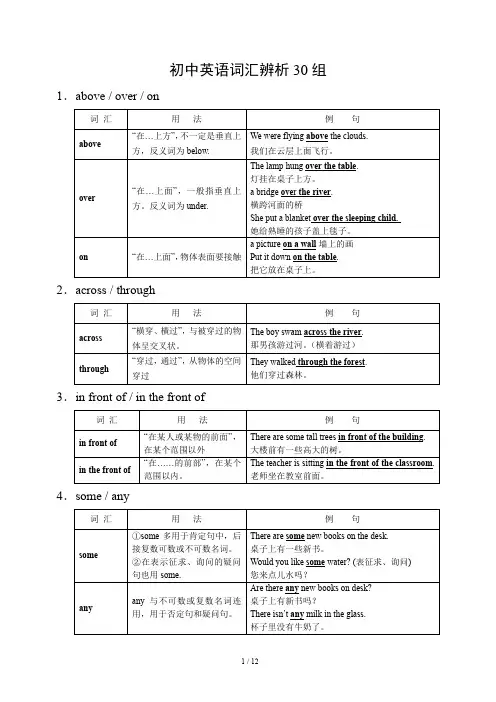
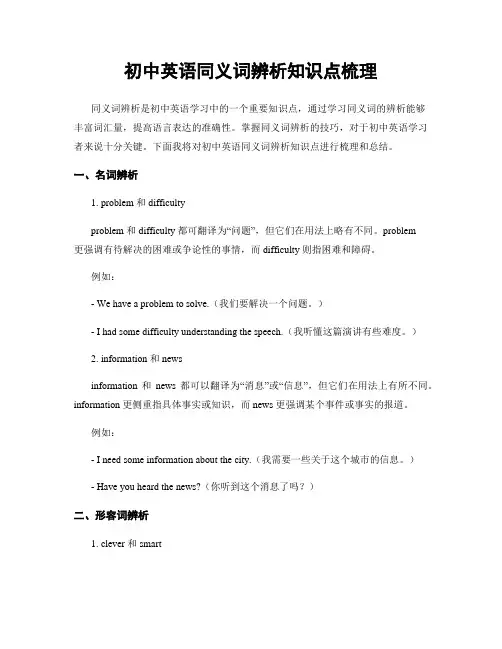
初中英语同义词辨析知识点梳理同义词辨析是初中英语学习中的一个重要知识点,通过学习同义词的辨析能够丰富词汇量,提高语言表达的准确性。
掌握同义词辨析的技巧,对于初中英语学习者来说十分关键。
下面我将对初中英语同义词辨析知识点进行梳理和总结。
一、名词辨析1. problem 和 difficultyproblem 和 difficulty 都可翻译为“问题”,但它们在用法上略有不同。
problem更强调有待解决的困难或争论性的事情,而 difficulty 则指困难和障碍。
例如:- We have a problem to solve.(我们要解决一个问题。
)- I had some difficulty understanding the speech.(我听懂这篇演讲有些难度。
)2. information 和 newsinformation 和news 都可以翻译为“消息”或“信息”,但它们在用法上有所不同。
information 更侧重指具体事实或知识,而 news 更强调某个事件或事实的报道。
例如:- I need some information about the city.(我需要一些关于这个城市的信息。
)- Have you heard the news?(你听到这个消息了吗?)二、形容词辨析1. clever 和 smartclever 和smart 都可以翻译为“聪明”的意思,但它们在用法和意义上有所差别。
clever 强调智力明晰,能够快速理解和解决问题,而 smart 则更侧重于外表和衣着得体。
例如:- He is a clever student who always gets good grades.(他是个聪明的学生,总是取得好成绩。
)- The boy looks smart in his new suit.(这个男孩穿上新衣服看起来很帅气。
)2. interesting 和 excitinginteresting 和 exciting 都可以翻译为“有趣”的意思,但它们在用法上有所区别。
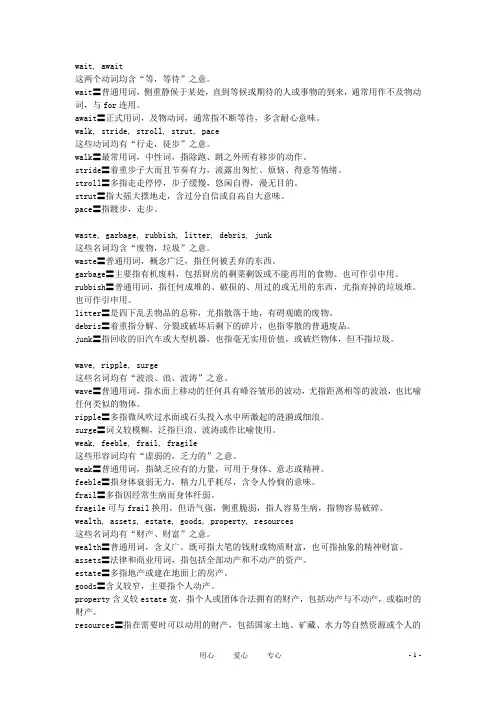
wait, await这两个动词均含“等,等待”之意。
wait〓普通用词,侧重静候于某处,直到等候或期待的人或事物的到来,通常用作不及物动词,与for连用。
await〓正式用词,及物动词,通常指不断等待,多含耐心意味。
walk, stride, stroll, strut, pace这些动词均有“行走,徒步”之意。
walk〓最常用词,中性词,指除跑、跳之外所有移步的动作。
stride〓着重步子大而且节奏有力,流露出匆忙、烦恼、得意等情绪。
stroll〓多指走走停停,步子缓慢,悠闲自得,漫无目的。
strut〓指大摇大摆地走,含过分自信或自高自大意味。
pace〓指踱步,走步。
waste, garbage, rubbish, litter, debris, junk这些名词均含“废物,垃圾”之意。
waste〓普通用词,概念广泛,指任何被丢弃的东西。
garbage〓主要指有机废料,包括厨房的剩菜剩饭或不能再用的食物。
也可作引申用。
rubbish〓普通用词,指任何成堆的、破损的、用过的或无用的东西,尤指弃掉的垃圾堆。
也可作引申用。
litter〓是四下乱丢物品的总称,尤指散落于地,有碍观瞻的废物。
debris〓着重指分解、分裂或破坏后剩下的碎片,也指零散的普通废品。
junk〓指回收的旧汽车或大型机器,也指毫无实用价值,或破烂物体,但不指垃圾。
wave, ripple, surge这些名词均有“波浪、浪、波涛”之意。
wave〓普通用词,指水面上移动的任何具有峰谷皱形的波动,尤指距离相等的波浪,也比喻任何类似的物体。
ripple〓多指微风吹过水面或石头投入水中所激起的涟漪或细浪。
surge〓词义较模糊,泛指巨浪、波涛或作比喻使用。
weak, feeble, frail, fragile这些形容词均有“虚弱的,乏力的”之意。
weak〓普通用词,指缺乏应有的力量,可用于身体、意志或精神。
feeble〓指身体衰弱无力,精力几乎耗尽,含令人怜悯的意味。
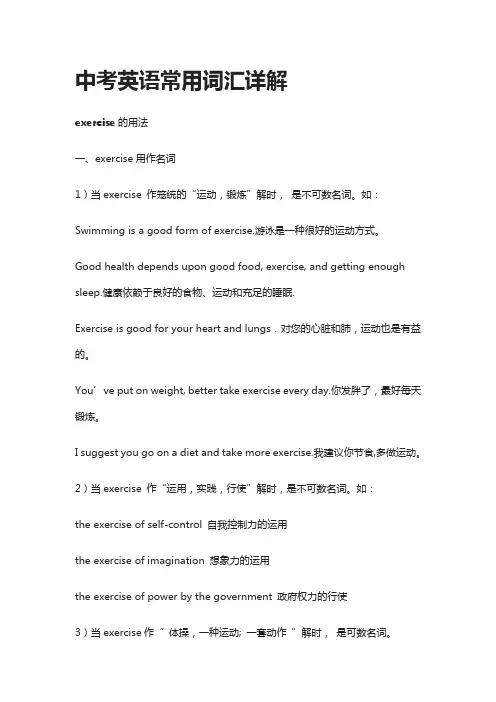
中考英语常用词汇详解exercise的用法一、exercise用作名词1)当exercise 作笼统的“运动,锻炼”解时,是不可数名词。
如:Swimming is a good form of exercise.游泳是一种很好的运动方式。
Good health depends upon good food, exercise, and getting enough sleep.健康依赖于良好的食物、运动和充足的睡眠.Exercise is good for your heart and lungs.对您的心脏和肺,运动也是有益的。
You’ve put on weight, better take exercise every day.你发胖了,最好每天锻炼。
I suggest you go on a diet and take more exercise.我建议你节食,多做运动。
2)当exercise 作“运用,实践,行使”解时,是不可数名词。
如:the exercise of self-control 自我控制力的运用the exercise of imagination 想象力的运用the exercise of power by the government 政府权力的行使3)当exercise作“体操,一种运动; 一套动作”解时,是可数名词。
We do morning exercises every morning. 我们每天上午做早操。
It's good to do eye exercises. 做眼保健操是有好处的。
I do physical exercises every day. 我每天都锻练身体。
Repeat the exercise ten times on each leg.每条腿重复做十次这种动作。
4)当exercise作“练习,习题;实习;(军)演习,操练;”时,是可数名词”。
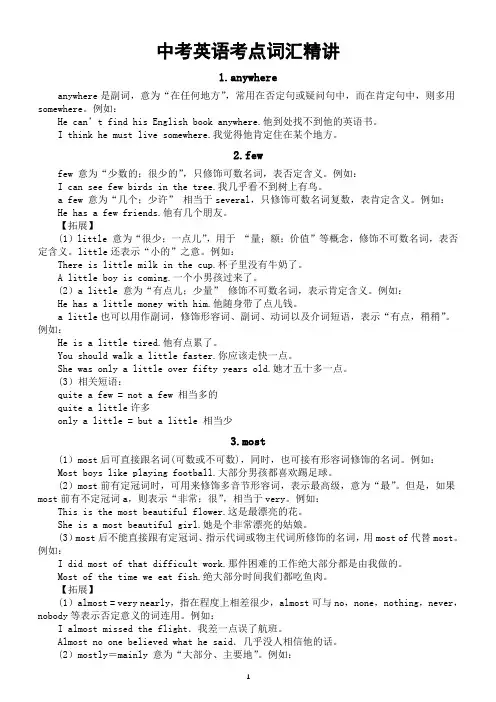
中考英语考点词汇精讲1.anywhereanywhere是副词,意为“在任何地方”,常用在否定句或疑问句中,而在肯定句中,则多用somewhere。
例如:He can’t find his English book anywhere.他到处找不到他的英语书。
I think he must live somewhere.我觉得他肯定住在某个地方。
2.fewfew 意为“少数的;很少的”,只修饰可数名词,表否定含义。
例如:I can see few birds in the tree.我几乎看不到树上有鸟。
a few 意为“几个;少许”相当于several,只修饰可数名词复数,表肯定含义。
例如:He has a few friends.他有几个朋友。
【拓展】(1)little 意为“很少;一点儿”,用于“量;额;价值”等概念,修饰不可数名词,表否定含义。
little还表示“小的”之意。
例如:There is little milk in the cup.杯子里没有牛奶了。
A little boy is coming.一个小男孩过来了。
(2)a little 意为“有点儿;少量”修饰不可数名词,表示肯定含义。
例如:He has a little money with him.他随身带了点儿钱。
a little也可以用作副词,修饰形容词、副词、动词以及介词短语,表示“有点,稍稍”。
例如:He is a little tired.他有点累了。
You should walk a little faster.你应该走快一点。
She was only a little over fifty years old.她才五十多一点。
(3)相关短语:quite a few = not a few 相当多的quite a little许多only a little = but a little 相当少3.most(1)most后可直接跟名词(可数或不可数),同时,也可接有形容词修饰的名词。
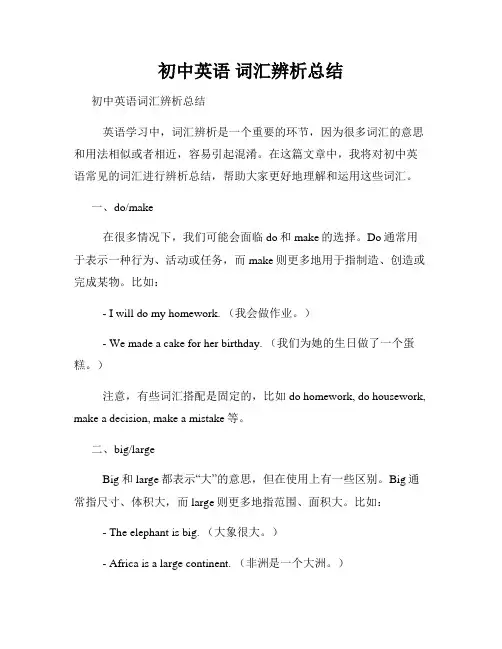
初中英语词汇辨析总结初中英语词汇辨析总结英语学习中,词汇辨析是一个重要的环节,因为很多词汇的意思和用法相似或者相近,容易引起混淆。
在这篇文章中,我将对初中英语常见的词汇进行辨析总结,帮助大家更好地理解和运用这些词汇。
一、do/make在很多情况下,我们可能会面临do和make的选择。
Do通常用于表示一种行为、活动或任务,而make则更多地用于指制造、创造或完成某物。
比如:- I will do my homework. (我会做作业。
)- We made a cake for her birthday. (我们为她的生日做了一个蛋糕。
)注意,有些词汇搭配是固定的,比如do homework, do housework, make a decision, make a mistake等。
二、big/largeBig和large都表示“大”的意思,但在使用上有一些区别。
Big通常指尺寸、体积大,而large则更多地指范围、面积大。
比如: - The elephant is big. (大象很大。
)- Africa is a large continent. (非洲是一个大洲。
)三、happy/gladHappy和glad都表示“高兴的”意思,但在使用上有细微差异。
Happy更通用,可以用于形容各种情绪的高兴,而glad则更强调突发的高兴、出乎意料的喜悦。
比如:- I am happy to see you. (见到你我很高兴。
)- We are glad to hear the news. (听到这个消息我们很高兴。
)四、buy/purchaseBuy和purchase都表示“购买”之意,但buy更常用,更口语化,而purchase则更正式一些。
在日常交流中,我们通常使用buy。
比如: - I bought a new book. (我买了一本新书。
)- He purchased a car last week. (他上周购买了一辆车。
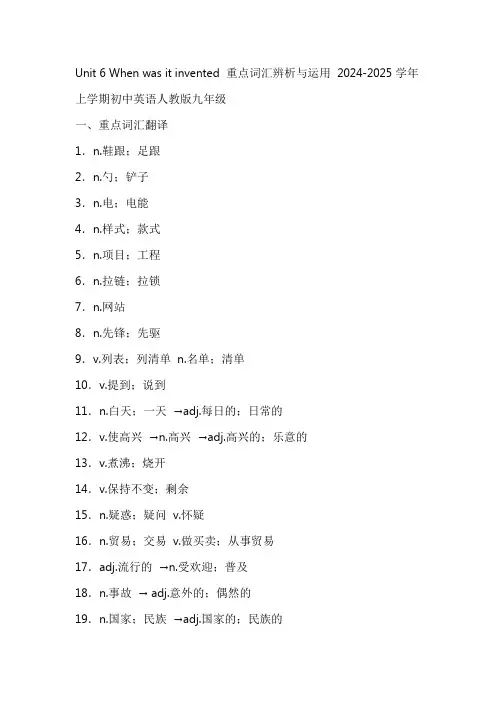
Unit 6 When was it invented 重点词汇辨析与运用2024-2025学年上学期初中英语人教版九年级一、重点词汇翻译1.n.鞋跟;足跟2.n.勺;铲子3.n.电;电能4.n.样式;款式5.n.项目;工程6.n.拉链;拉锁7.n.网站8.n.先锋;先驱9.v.列表;列清单n.名单;清单10.v.提到;说到11.n.白天;一天→adj.每日的;日常的12.v.使高兴→n.高兴→adj.高兴的;乐意的13.v.煮沸;烧开14.v.保持不变;剩余15.n.疑惑;疑问v.怀疑16.n.贸易;交易v.做买卖;从事贸易17.adj.流行的→n.受欢迎;普及18.n.事故→ adj.意外的;偶然的19.n.国家;民族→adj.国家的;民族的20.v.统治;支配n.规则→n.尺子;统治者;支配者21.n.气味v.发出……气味;闻到→(过去式) →(过去分词) 22.n. 冰箱23.adj. 低的;矮的24.v. 锁上;锁住n. 锁25.n. 地震26.n. 钟(声);铃(声)27.n. 饼干28.n. 曲奇饼29.n. 器械;仪器;工具30.pron. 某人n. 重要人物31.v. 翻译→n. 翻译32.adj. 突然(的) →adv. 突然33.n. 音乐→adj. 音乐的;有音乐天赋的→n.音乐家34.v. (使) 发出钟声或铃声;打电话→(过去式) →(过去分词) 35.adj.脆的;酥脆的36.n.盐→adj.咸的37.adj.酸的;有酸味的38.n.顾客;客户39.v.分开;分散40.n.篮;筐41.adv.几乎42.n.英雄;男主角→(复数)43.n.职业→a dj.职业的;专业的44.n.加拿大→adj.加拿大的;加拿大人的n.加拿大人二、词汇辨析与用法45.style名词,意为“样式;款式;方式;风格”,短语表示“时髦的;流行的”;短语表示“过时的”。
46.pleasure名词,意为“高兴;愉快”,其相关词为:“v. 使满意;使愉快”;“adj.满意的;高兴的”;“adj.令人愉快的”。
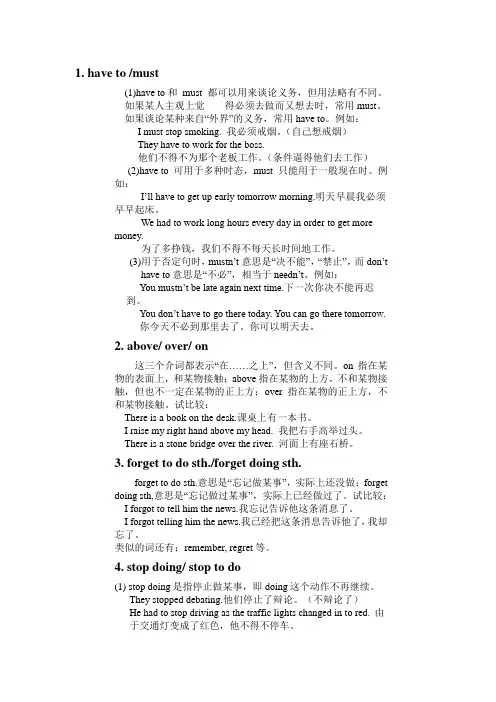
1. have to /must(1)have to和must 都可以用来谈论义务,但用法略有不同。
如果某人主观上觉得必须去做而又想去时,常用must。
如果谈论某种来自“外界”的义务,常用have to。
例如:I must stop smoking. 我必须戒烟。
(自己想戒烟)They have to work for the boss.他们不得不为那个老板工作。
(条件逼得他们去工作)(2)have to 可用于多种时态,must 只能用于一般现在时。
例如:I’ll have to get up early tomorrow morning.明天早晨我必须早早起床。
We had to work long hours every day in order to get more money.为了多挣钱,我们不得不每天长时间地工作。
(3)用于否定句时,mustn’t意思是“决不能”,“禁止”,而don’thave to意思是“不必”,相当于needn’t。
例如:Y ou mustn’t be late again next time.下一次你决不能再迟到。
Y ou don’t have to go there today. Y ou can go there tomorrow.你今天不必到那里去了。
你可以明天去。
2. above/ over/ on这三个介词都表示“在……之上”,但含义不同。
on指在某物的表面上,和某物接触;above指在某物的上方,不和某物接触,但也不一定在某物的正上方;over指在某物的正上方,不和某物接触。
试比较:There is a book on the desk.课桌上有一本书。
I raise my right hand above my head. 我把右手高举过头。
There is a stone bridge over the river. 河面上有座石桥。
3. forget to do sth./forget doing sth.forget to do sth.意思是“忘记做某事”,实际上还没做;forget doing sth,意思是“忘记做过某事”,实际上已经做过了。
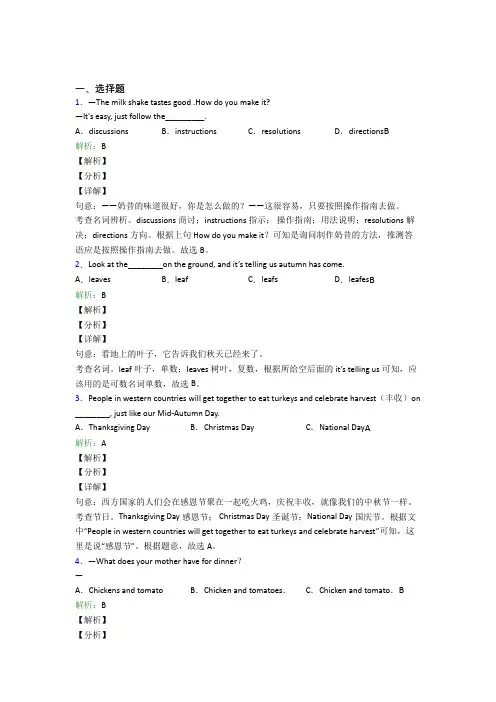
一、选择题1.—The milk shake tastes good .How do you make it?—It's easy, just follow the_________.A.discussions B.instructions C.resolutions D.directions B解析:B【解析】【分析】【详解】句意:——奶昔的味道很好,你是怎么做的?——这很容易,只要按照操作指南去做。
考查名词辨析。
discussions商讨;instructions指示;操作指南;用法说明;resolutions解决;directions方向。
根据上句How do you make it?可知是询问制作奶昔的方法,推测答语应是按照操作指南去做。
故选B。
2.Look at the________on the ground, and it’s telling us autumn has come.A.leaves B.leaf C.leafs D.leafes B解析:B【解析】【分析】【详解】句意:看地上的叶子,它告诉我们秋天已经来了。
考查名词。
leaf叶子,单数;leaves树叶,复数,根据所给空后面的it’s telling us可知,应该用的是可数名词单数,故选B。
3.People in western countries will get together to eat turkeys and celebrate harvest(丰收)on ________, just like our Mid-Autumn Day.A.Thanksgiving Day B.Christmas Day C.National Day A解析:A【解析】【分析】【详解】句意:西方国家的人们会在感恩节聚在一起吃火鸡,庆祝丰收,就像我们的中秋节一样。
考查节日。
Thanksgiving Day感恩节; Christmas Day圣诞节;National Day国庆节。

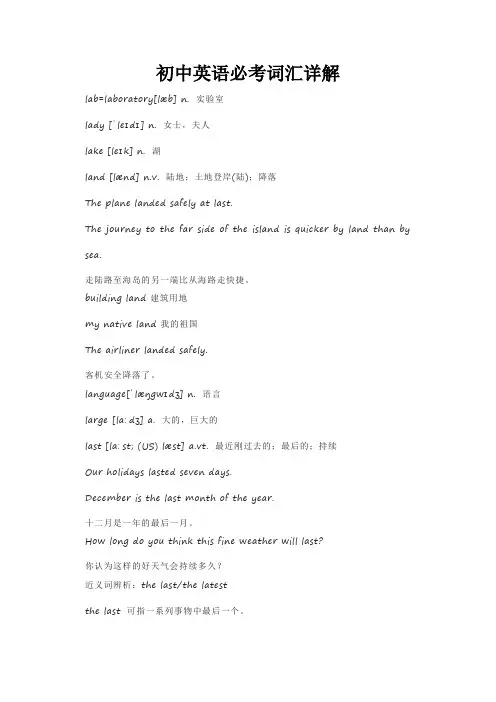
初中英语必考词汇详解lab=laboratory[læb] n. 实验室lady [ˈleɪdɪ] n. 女士,夫人lake [leɪk] n. 湖land [lænd] n.v. 陆地;土地登岸(陆);降落The plane landed safely at last.The journey to the far side of the island is quicker by land than by sea.走陆路至海岛的另一端比从海路走快捷。
building land 建筑用地my native land 我的祖国The airliner landed safely.客机安全降落了。
language[ˈlæŋɡwɪdʒ] n. 语言large [lɑːdʒ] a. 大的,巨大的last [lɑːst; (US) læst] a.vt. 最近刚过去的;最后的;持续Our holidays lasted seven days.December is the last month of the year.十二月是一年的最后一月。
How long do you think this fine weather will last?你认为这样的好天气会持续多久?近义词辨析:the last/the latestthe last 可指一系列事物中最后一个。
The last bus leaves at 11:15 p.m.末班公车晚上11点15分开出。
the latest 意为“最近的,最新的”She always dressed in the latest fashion.她总是穿最新款时装。
late [leɪt] a.ad. 晚的,迟的晚地,迟地My flight was an hour late.我那趟航班晚了一个小时。
in the late afternoon 在傍晚in late summer 在夏末She married late. 她结婚晚。
初中词义疑点辨析知识总结词义疑点辨析是初中英语学习中一个关键的部分。
在阅读理解和写作中,正确理解和使用单词的意思至关重要。
然而,由于英语中存在许多词义相似又有细微差别的词汇,学生常常会有困惑和错误。
本文将对初中英语学习中常见的词义疑点进行总结和解析,帮助学生更好地理解和运用这些词汇。
1. teach, learn和study这三个词在学习过程中经常出现,但它们的用法有所不同。
teach是教书的意思,表示向他人传授知识;learn是学习的意思,表示自己获取新的知识或技能;而study是学习的过程,是指花时间努力地学习。
所以我们可以说:“My teacher teaches me English.”(我的老师教我英语。
),“I learn English at school.”(我在学校学英语。
),“I study for three hours every day.”(我每天学习三个小时。
)2. bored和boring这两个形容词都和无聊或厌烦有关,但含义不同。
bored是形容人感到厌烦或无聊,而boring是指事物本身令人感到无聊。
所以,我们可以说:“I am bored because the movie is so boring.”(这部电影太无聊了,我感到很厌烦。
)3. history和storyhistory指的是历史,而story是指故事。
历史通常是真实的过去事件,而故事可以是真实的,也可以是虚构的。
例如:“I learned a lot of history in my history class.”(在历史课上我学到了很多历史知识。
),“She read an interesting story abouta princess.”(她读了一个关于公主的有趣故事。
)4. healthy和healthful这两个形容词都和健康有关,但含义有所不同。
healthy是指人或事物本身是健康的,而healthful是指对健康有益的。
初中英语常见易混词汇辨析在初中英语的学习中,同学们常常会遇到一些容易混淆的词汇,这些词汇在拼写、发音、词义或用法上有相似之处,给我们的理解和运用带来了一定的困难。
下面就为大家详细辨析一些常见的易混词汇。
一、“a”和“an”“a”和“an”都属于不定冠词,用于泛指一个人或事物。
“a”用于以辅音音素开头的单词前,“an”用于以元音音素开头的单词前。
需要注意的是,这里所说的“元音音素”和“辅音音素”指的是读音,而不是字母。
例如,“a book”(一本书),“an apple”(一个苹果)。
“hour”(小时)这个单词虽然以“h”开头,但“h”不发音,它的读音是以元音音素开头,所以应该说“an hour”。
二、“alone”和“lonely”“alone”表示“独自的,单独的”,侧重于指客观上的独自一人,没有同伴。
“lonely”则表示“孤独的,寂寞的”,侧重于指主观上感到孤独、寂寞,带有感情色彩。
例如,“He lives alone but he doesn't feel lonely”(他独自生活,但并不感到孤独。
)三、“bring”和“take”“bring”意为“带来,拿来”,指把某物从别处带到说话者所在的地方。
“take”意为“拿走,带走”,指把某物从说话者所在的地方带到别处。
例如,“Bring your book here”(把你的书带到这儿来。
)“Take this bag to your room”(把这个包拿到你的房间去。
)四、“in front of”和“in the front of”“in front of”表示“在……前面”,指在某个物体外部的前面。
“in the front of”也表示“在……前面”,但指在某个物体内部的前面。
例如,“There is a tree in front of the house”(房子前面有一棵树。
)“The driver is sitting in the front of the bus”(司机坐在公共汽车的前部。
中考英语词汇辨析1.spend,pay,cost,takesb. spend +时间/金钱 on sth. 某人在…上花费时间/金钱e.g. I spend two hours on English every day. 我每天花两小时学英语。
sb. spend +时间/金钱 (in) doing sth. 某人花费时间/金钱做某事e.g. Tom spends 5 dollar updating his computer system. Tom花五美元更新他的电脑系统。
sb. pay + 金钱 for…某人在...上花费金钱e.g. I paid 100 yuan for the shirt. 我花100元买这件T恤。
sth. cost sb. + 金钱/时间…花了某人的金钱/时间(cost的用法中,花金钱的出现频率比花时间高)e.g. It costs him ten euros. 它花了他十欧元。
It takes/took sb. +时间/金钱 to do sth. 花了某人时间/金钱做某事It takes me 6 minutes to take a shower. 冲澡花了我6分钟。
… take sb. +时间/金钱. …花了某人时间/金钱。
注意:spend和pay主语通常是人,而cost和take主语通常是物。
2.“at,on,in + 时间”at, on, in+时间,均可表示"在……的时候"。
at + 具体的时间点I get up at six o'clock in the morning . 我早晨六点起床。
Breakfast would be finished at seven.早餐将在七点结束。
on+具体某一天或具体某一个早上(下午、晚上)on Monday 在星期一on Sunday morning 在星期天早上(特指)on July 1st 在七月1日on a cold night in 1938 在1938年的一个寒冷的晚上in+具体某一年(季、月),早上,下午,晚上in 2020 在2020年in September 在九月in the morning 在早上(泛指)in the evening 在晚上可见at后跟的时间更精准,on次之,in排在最后。
初中英语易混易错同义词辨析大全1.clothes, cloth, clothingclothes统指各种衣服,谓语动词永远是复数,cloth指布,为不可数名词clothing 服装的总称,指一件衣服用a piece of, an article of2.incident, accidentincident指小事件, accident指不幸的事故He was killed in the accident.3.amount, numberamount后接不可数名词,number后接可数名词a number of students4.family, house, homehome 家,包括住处和家人,house房子,住宅,family家庭成员. My family is a happy one.5.sound, voice, noisesound自然界各种各样的声音,voice人的嗓音,noise噪音I hate the loud noise outside.6.photo, picture, drawingphoto用照相机拍摄的照片,picture可指相片,图片,电影片,drawing画的画Let’s go and see a good picture.7.vocabulary, wordvocabulary词汇,一个人拥有的单词量,word具体的单词He has a large vocabulary.8.population, peoplepopulation人口,人数,people具体的人China has a large population.9.weather, climateweather一天内具体的天气状况,climate长期的气候状况The climate here is not good for you.10.road, street, path, wayroad具体的公路,马路,street街道,path小路,小径,way道路,途径take this road; in the street, show me the way to the museum.11. course, subjectcourse课程(可包括多门科目),subject科目(具体的学科)a summer course12.custom, habitcustom传统风俗,习俗,也可指生活习惯,后接to do,habit生活习惯,习惯成自然,后接of doing. I’ve got the habit of drinking a lot.13.cause, reasoncause 指造成某一事实或现象的直接原因,后接of sth./doing sth,reason用来解释某种现象或结果的理由,后接for sth./doing sth. the reason for being late14.exercise, exercises, practiceexercise运动,锻炼(不可数),exercises练习(可数),practice(反复做的)练习Practice makes perfect.15.class, lesson作"课"解时,两者可以替换.指课文用lesson. 指班级或全体学生用class. lesson 6; class 516. speech, talk, lecturespeech指在公共场所所做的经过准备的较正式的演说,talk日常生活中的一般的谈话,讲话,lecture学术性的演讲,讲课a series of lecture on…17.officer, officialofficer部队的军官,official政府官员an army officer18.work, job二者均指工作。
中考英语重点词汇辨析1.a bit/ a little(1)这两个词都意为“一点儿”有时可以互换,但有时不能。
Ⅰ.二者都可作程度副词修饰动词,形容词、副词或其比较级;意义相同,为“一点儿”“有些”。
如:①I am a bit / a little hungry.我有点饿。
②He walked a bit / a little slowly.他走路有点慢。
Ⅱ.二者都可以用作名词词组,充当主语或宾语。
如:① A little / bit is enough for me.我有一点儿就够了。
② I know only a little / a bit about her.我对她的情况只了解一点。
Ⅲ.区别:(1) a little可直接修饰名词;a bit后须加of才可以。
如:①.There is a little water in the bottle.= There is a bit of water in the bottle.[注意] a little of 后的名词通常特指,表“……中的一些”,如:①May I have a little of your tea? 我能喝一点你的茶吗?(2)否定形式的用法不同:not a little 作状语,相当于very/ quite, “很”,“非常”;作宾语时,相当于much/a lot, 意为“许多”。
而not a bit 作状语时,相当于not at all, 意为“一点也不”,作宾语时则相当于not much.例如:①He is not a little hungry.= He is very hungry.他饿极了。
②He is not a bit hungry.=He is not hungry at all.他一点也不饿。
③She ate not a little.=She ate a lot.她吃得很多。
not a bit中的not 可以分开使用;not a little中的not 则不能分开。
初中英语常考词汇详解1.beat(n)敲击,跳动(vt)打,输beaten track常规;惯例;被踩出来的路辨析:beat和win的用法:①beat表示“在战斗中战胜对手,宾语是人,不是物”。
beat后接运动员、球队或对手等。
例如:I can beat you at chess.②beat意为“胜于,击败”。
例:He is going to beat the world record.③win战胜,因赢,它的宾语是物,如比赛,战争。
win后接“a game,a war,a watch,a prize”等。
例:The boy won the first prize in contest.I can always beat him at chess.Which team win the football match?We beat them by score2to1.辨析:beat;hit;strike的用法:这三个词都有"打;击;敲"的意思,但仔细分辩,还是有其各自的用法。
①beat 表示"连续不断地打击";尤其指心脏的跳动。
●beat sb in the chest●beat…to death●to beat a drum敲鼓②hit表示"撞击"(尤指一次性的)或命中(目标)。
而strike除了与hit同义外,还可以理解为划(火柴);给人深刻印象等。
如:The man looked dead but his heart was still beating.这个人看上去已经死了,可心脏还在跳动。
He hit the ball so hard that it went over the wall.他使劲地击球,结果球越过了墙。
I have some_________to do this afternoon. A.shop B.shops C.shopping D.a shopHe____his opponent in the game at last. A.beat B.beated C.beaten D.was beating2.fame(n)名声;名气;声誉famous(adj)出名的;著名的be famous/known for因/以……而著名(for后接出名的原因)be famous/known as作为……而出名/著名(接职务、身份或地位等名词)be famous/known to对……来说出名※比较:be famous as;be famous for;be famous to和be famous at的用法:【一】以“地方”做主语:①be famous for表示“以某种特产而‘闻名’著名,出名”,famous相当于well-known②be famous as表示“以什么样的产地或地方而出名”。
初中英语词汇辨析1. clothes, cloth, clothingclothes 统指各种衣服,谓语动词永远是复数,cloth 指布,为不可数名词clothing 服装的总称,指一件衣服用 a piece of, an article of2. incident, accidentincident 指小事件,accident 指不幸的事故He was killed in the accident.3. amount, numberamount 后接不可数名词,number 后接可数名词 a number of students4. family, house, homehome 家,包括住处和家人,house 房子,住宅,family 家庭成员。
My family is a happy one. 5. sound, voice, noisesound 自然界各种各样的声音,voice 人的嗓音,noise 噪音I hate the loud noise outside.6. photo, picture, drawingphoto 用照相机拍摄的照片,picture 可指相片,图片,电影片,drawing 画的画Let's go and see a good picture.7. vocabulary, wordvocabulary 词汇,一个人拥有的单词量,word 具体的单词He has a large vocabulary.8. population, peoplepopulation 人口,人数,people 具体的人China has a large population.9. weather, climateweather 一天内具体的天气状况,climate 长期的气候况The climate here is not good for you.10. road, street, path, wayroad 具体的公路,马路,street 街道,path 小路,小径,way 道路,途径take this road; in the street, Show me the way to the museum.11. course, subjectcourse 课程(可包括多门科目),subject 科目(具体的学科)a summer course12. custom, habitcustom 传统风俗,习俗,也可指生活习惯,后接to do,habit 生活习惯,习惯成自然,后接of doing.I've got the habit of drinking a lot.13. cause, reasoncause 指造成某一事实或现象的直接原因,后接of sth./doing sth,reason 用来解释某种现象或结果的理由,后接for sth./doing sth. the reason for being late14. exercise, exercises, practiceexercise 运动,锻炼(不可数),exercises 练习(可数),practice(反复做的)练习。
Practice makes perfect.15. class, lesson作“课”解时,两者可以替换。
指课文用lesson. 指班级或全体学生用class. Lesson 6; Class 5 16. speech, talk, lecturespeech 指在公共场所所做的经过准备的较正式的演说,talk 日常生活中的一般的谈话,讲话,lecture 学术性的演讲,讲课 a series of lecture on …17. officer, officialofficer 部队的军官,official 政府官员an army officer18. work, job二者均指工作。
work 不可数,job 可数 a good job。
19. couple, paircouple 主要指人或动物,pair 多指由两部分组成的东西 a pair of trousers20. country, nation, state, landcountry 侧重指版图,疆域,nation 指人民,国民,民族,state 侧重指政府,政体,land 国土,国家The whole nation was sad at the news.21. cook, cookercook 厨师,cooker 厨具He is a good cook.22. damage, damagesdamage 不可数名词,损害,损失; damages 复数形式,赔偿金$900 damages23. police, policemanpolice 警察的总称,后接复数谓语动词,policeman 指某个具体的警察The police are questioning everyone in the house.24. problem, questionproblem 常和困难连系,前面的动词常为think about, solve, raise,question 常和疑问连系,多和ask, answer 连用。
25. man, a manman 人类,a man 一个男人Man will conquer nature.26. chick, chicken二者均可指小鸡,chicken 还可以当鸡肉The chicken is delicious.27. telegram, telegraph当电报解时,telegram 指具体的,telegraph 指抽象的 a telegram, by telegraph28. trip, journey, travel, voyagetravel 是最常用的,trip 指短期的旅途,journey 指稍长的旅途,voyage 指海上航行 a three-day trip29. sport, gamesport 多指户外的游戏或娱乐活动,如打球,游泳,打猎,赛马等;game 指决定胜负的游戏,通常有一套规则His favorite sport is swimming.30. price, prizeprice 价格,prize 奖,奖品,奖金win the first prize The price is high/low.31. a number of, the number ofa number of 许多,谓语动词用复数。
the number of …的数目,谓语动词用单数。
The number ofstudents is increasing.32. in front of, in the front ofin front of 范围外的前面,in the front of 范围内的前面In the front of the room sits a boy.33. of the day, of a dayof the day 每一天的,当时的,当代的,of a day 暂时的,不长久的 a famous scientist of the day34. three of us, the three of usthree of us 我们(不止三个)中的三个,the three of us 我们三个(就三个人)The three of us --- Tom, Jack and I went to the cinema.35. by bus, on the busby bus 表手段,方式,不用冠词,on the bus 表范围They went there by bus.36. for a moment, for the momentfor a moment 片刻,一会儿,for the moment 暂时,一时Thinking for a moment, he agreed.37. next year, the next yearnext year 明年,将来时间状语,the next year 第二年,过去将来时间状语He said he would go abroad the next year.38. more than a year, more than one yearmore than a year 一年多,more than one year 超过一年(两年或三年等)39. take advice, take the(one's) advicetake advice 征求意见,take the advice 接受忠告He refused to take the advice and failed again.40. take air, take the airtake air 传播,走漏,take the air 到户外去,散步We take the air every day.41. in a word, in wordsin a word 总之,一句话,in words 口头上In a word, you are right.42. in place of, in the place ofin place of 代替,in the place of 在…地方 A new building is built in the place of the old one.43. in secret, in the secretin secret 秘密地,暗自地,偷偷地,一般用作状语;in the secret 知道内情,知道秘密,一般用作表语My mother was in the secret from the beginning.44. a girl, one girla girl 可泛指所有女孩, one girl 一个女孩Can one girl carry such a big box?45. take a chair, take the chairtake a chair 相当于sit down 坐下,take the chair 开始开会46. go to sea, by sea, by the sea50. in charge of, in the charge ofin charge of 管理,负责照料,in the charge of 由……照料He is in charge of the matter.The matter is in the charge of her.51. in class, in the classin class 在课上,in the class 在班级里He is the best student in the class.52. on fire, on the fireon fire 着火, on the fire 在火上Put the food on the fire. The house is on fire.53. out of question, out of the questionout of question 毫无疑问的,out of the question 不可能的54. a second, the seconda second 又一,再一,the second 第……He won the second prize.55. by day, by the dayby day 白天,by the day 按天计算The workers are paid by the day.56. the people, a peoplethe people 指人,a people 指民族The Chinese is a peace-loving people.57. it, oneit 同一物体,one 同类不同一I lost my pen. I have to buy a new one.58. that, thisthat 指代上文所提到的,this 导出下文所要说的I was ill. That's why ….59. none, nothing, no onenone 强调有多少,nothing, no one 强调有没有,nothing 指物,no one 指人--- How many …/How much …?--- None.60. anyone, any oneanyone 指人,不能接of,any one 指人物均可,可接of any one of you61. who, whatwho 指姓名或关系,what 指职业或地位What is your dad? He is a teacher.62. what, whichwhat 的选择基础是无限制的,which 在一定范围内进行选择Which do you prefer, bananas or apples?63. other, anotherother 后接名词复数,another 后接名词单数other students, another student64. not a little, not a bitnot a little 非常,not a bit 一点也不I'm not a bit tired. 我一点儿也不累。